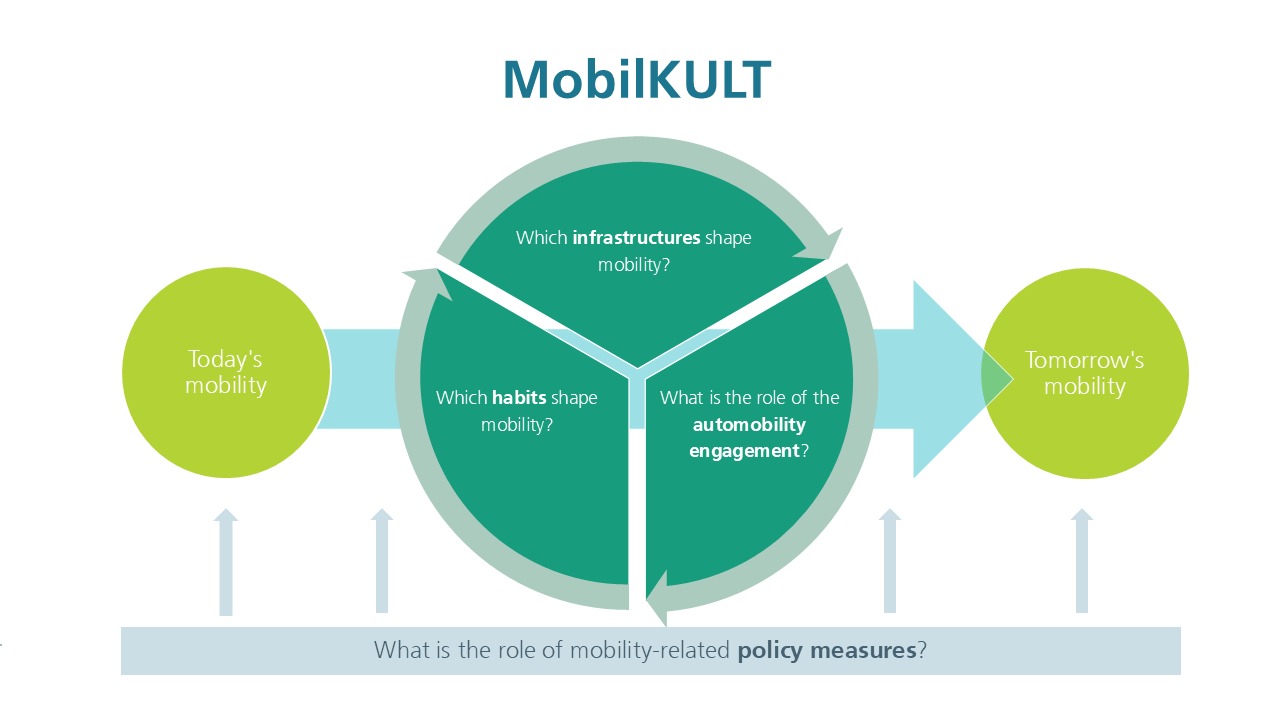MobilKULT – Initial results of the panel study on mobility habits and attitudes
MobilKULT examines the connections between infrastructures, mobility habits, attitudes toward mobility and selected policy measures. In this way, the study contributes to a better understanding of the possibilities and limitations of a mobility transition. We collect the data every six months using surveys in the German states of Baden-Württemberg and Mecklenburg-Western Pomerania. In this blog post, we present the results of the first round of the survey.
Mobility is used to satisfy various needs and is also an expression of our lifestyle and culture. However, mobility is also a controversial issue: We know that a significant proportion of the current mobility habits in Germany, particularly driving and flying, cause excessive CO2 emissions.
In terms of climate protection, the mobility habits in Germany are no longer sustainable. At the same time, our modern lifestyle depends on a wide range of mobility options
Many people are faced with a dilemma: Private motorized transport causes excessive emissions, but at the same time there are too few appealing and accessible alternatives to satisfy people's mobility needs in a more environmentally-friendly way.
But is that really the case? Who would like to change their habits, and why are they currently finding it difficult to do so? What are the current mobility habits of different groups of people and in regions with different infrastructures? How strongly does today's car culture influence people's willingness to change in urban and rural areas? What policy do people think is best suited to develop mobility further?
MobilKULT gets to the bottom of these and other questions.
A brief overview of the MobilKULT panel study
At intervals of around six months, a representative sample of some 2,500 people from Baden-Württemberg and Mecklenburg-Western Pomerania are able to give their opinion on four aspects in the surveys: Infrastructure, political measures, car culture and habits.
Our primary aim is to survey the same people again and again in order to record changes in their habits or attitudes. A more detailed description of the various topics, methods and results can be found on the project website.
What key insights have we gained from MobilKULT so far?
The car is and remains the most popular means of transport – regardless of region. In urban areas, the use of cars is lower, partly because there are many other modes of transport available for everyday mobility. However, those who travel a lot, particularly in rural areas, would like to “switch” – preferably to cycling or walking more.
At the same time – and this is consistent with many other studies – in rural areas access to alternative services such as public transport is rather limited and the perceived dependence on cars is high. This is a well-known dilemma that needs to be resolved with smart political measures.
Another factor is the different significance that people attribute to (their own) cars. Interestingly, people who drive a lot perceive a greater degree of dependence on cars, but at the same time have a stronger desire for living conditions that reinforce this dependency, for example by owning their own home in the countryside. They associate more positive feelings with driving and rate driving as more pleasant than people who travel less by car.
Those who travel less by car feel greater social pressure to use alternative means of transport, have a greater aversion to driving and a greater awareness of the negative environmental impact of driving.
These results demonstrate that the attitude toward cars is linked with a range of ideas about lifestyle as well as public debate.
The fact that the car is more than just a mode of transport and is bound up with emotions needs to be taken into account by policymakers, especially as opinions on political measures are somewhat polarized: People who drive less are more in favor of more restrictive measures with regard to cars than people who drive more – such as a general speed limit or car-free inner cities.
What's next for MobilKULT?
The results of the second round of the survey are currently being evaluated. We are curious to see how much habits, attitudes and the assessment of policy measures change over time.
When we post the results on our project website we will also update you on our blog and on social media, as we would like our study to contribute to the current public debate.
